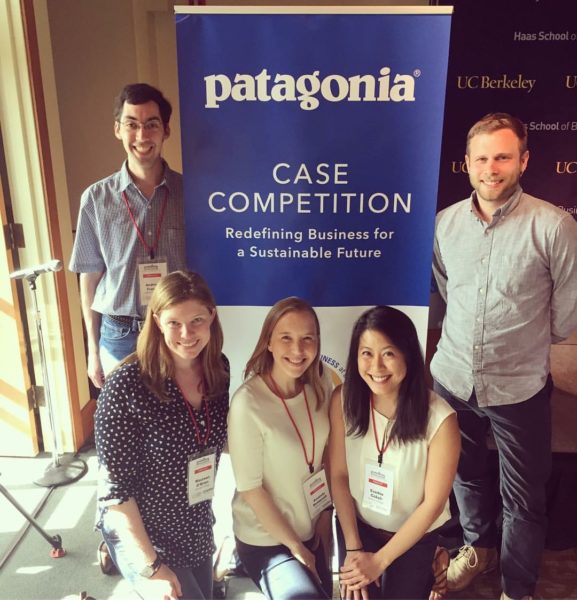What Do Regenerative Organic Farmers and MBA Students Have in Common?
By Evadne Cokeh, Andrew Franks, Maureen O’Brien, Amanda Roosevelt and Ty Thiele (MBA’17).
Each year Patagonia and The Hass School of Business at UC Berkeley host The Patagonia Case Competition that challenges graduate students from across the US to solve one of the company’s real-life sustainability issues. This year’s competition asked students to propose methods for Patagonia to accelerate regenerative organic agricultural practices throughout the United States. Regenerative organic agriculture is a type of farming that aims to reduce soil carbon emissions to decrease the effects of climate change. Our solution encourages Patagonia to facilitate loans, build mentoring programs, provide analytic tools, and forge strategic partnerships to help farmers transition and expand their regenerative organic farming practices.

The Babson team at the 2017 Patagonia Case Competition.
Several weeks ago we learned that our proposal was accepted into the semi-finals, which includes a presentation to Patagonia executives at the Haas School of Business in Berkeley, CA. We will be joined by nine other MBA teams from Columbia, Cornell, Harvard, MIT, Berkeley, Michigan, UPenn, UVA and Yale. In preparing for our presentation, we’ve discovered that regenerative organic farmers share a lot in common with MBA students. We both…
Grow in New Ways
As they transition to regenerative organic agricultural practices, farmers need to grow their crops and manage their farm in new ways. While farmers might produce the same products, they have to incorporate new techniques such as utilizing cover crops, introducing crop rotation, composting, and reducing tillage.
Our group was also challenged to grow in new ways. We knew very little about farming, and hardly anything about regenerative organic agriculture. But this didn’t stop us from entering the competition. We used this as an opportunity to learn a new industry and apply our business skills in an entirely new way.
Need Funding
If a farmer decides to make the leap to regenerative organic farming practices, the transition period is risky and expensive. While the future holds potential for higher yields, lower input costs, and more resilient land, the vast majority of farmers lack the financial resources to pay for startup costs or survive a rocky transition period.
As full-time MBA students, we understand the financial impact of a transition period. While it’s risky to leave our full time jobs to spend two years in school, we also know the future holds higher potential. Shout out to Babson’s Student Leadership Initiative Fund for helping underwrite our travel to California for the competition!
Utilize A Network
Many farmers using regenerative agriculture practices cluster together to form “hot spots,” where they’re surrounded by like-minded farmers facing similar challenges. Farmers use these networks to ask questions, gain information, and help their farm become more efficient and sustainable.
In order to learn as much as possible in a short period of time, we reached out to our network to interview over 15 farmers, impact investors, and organic food companies. By tapping our networks we were able to gain first hand insights from farmers who have transitioned to regenerative organic practices, we spoke to the VP of Corporate Responsibility and Chief Sustainability Officer of Campbell Soup Company and the CEO of Annie’s Homegrown to understand the motivation of the food industry, and we interviewed the CFO of Iroquois Valley Farms in order to learn more about agriculture loan structures.
Strive to Help the Planet
Farmers transition to regenerative organic agricultural in order to help our planet. Earth’s soil holds an incredible amount of carbon. In traditional farming, soil tilling results in increased carbon emissions which exacerbates climate change. By introducing regenerative organic agriculture practices, farmers sequester carbon within the soil which helps offset the world’s annual carbon emissions and reverses climate change.
Our team members gravitated to each other due to our interest in social impact. The Patagonia case competition was the perfect opportunity for us to explore real issues a social impact company faces. While we all love our Patagonia gear, we are especially drawn to the company’s mission: “Build the best product, cause no unnecessary harm, use business to inspire and implement solutions to the environmental crisis.”
As we head out to Berkeley to present our case on April 20, we will use these commonalities to showcase the ways Patagonia can help the regenerative agriculture movement expand. Wish us luck!
